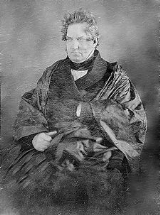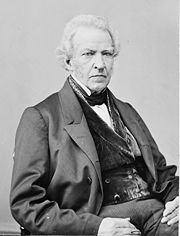
James Moore Wayne
Encyclopedia
James Moore Wayne was an Associate Justice of the Supreme Court of the United States
and was a United States Representative from Georgia
.
 Born in Savannah, Georgia
Born in Savannah, Georgia
, Wayne was the son of Richard Wayne, who came to the US in 1760 and married, on Sept. 14th, 1769, Elizabeth Clifford (? - 1804), born in Charleston, SC. Wayne graduated from Princeton University
in 1808, read law to be admitted to the bar
in 1810, and began his practice in Savannah. He served in the United States Army
during the War of 1812
, from 1812 to 1815, as an officer in the Georgia Hussars. He served in the Georgia House of Representatives
from 1815 to 181. He then served as the mayor
of Savannah from September 8, 1817 to July 12, 1819, thereafter returning to private practice in Savannah until 1824.
He then served as a Judge, first of the Court of Common Pleas in Savannah, Georgia from 1819 to 1824, and then of the Superior Court of Georgia from 1824 to 1829, until he was elected as a Jacksonian to the United States Congress from March 4, 1829, to January 13, 1835. He resigned to accept the appointment as an Associate Justice to the Supreme Court. He was nominated by President Andrew Jackson
on January 6, 1835, to a seat vacated by William Johnson
, and was confirmed by the United States Senate
on January 9, 1835, receiving his commission the same day. He served on the court from January 14, 1835 to his death on July 5, 1867. He favored free trade, opposed internal improvements by Congress, except of rivers and harbors, and opposed the rechartering of the United States Bank
.
Wayne died in Washington, D.C.
, and was interred in Laurel Grove Cemetery
, Savannah, Georgia. His sister Mary was the great-grandmother of Juliette Gordon Low
, the founder of the Girl Scouts of the USA
. In 1831, he sold his home to William Washington Gordon
, Juliette's grandfather. This home is now called the Juliette Gordon Low birthplace.
In order to prevent President Andrew Johnson from appointing any justices, Congress passed the Judicial Circuits Act
in 1866, eliminating three seats from the Supreme Court as they became vacant. Justice John Catron
had already died in 1865, and upon Wayne's death, it reduced the number of justices from ten to eight. In 1869, Congress passed the Circuit Judges Act, setting the court at nine members. As only two seats were vacated between 1866 and 1869, the Court had eight justices at the time of this Act, so one new seat was created.
Supreme Court of the United States
The Supreme Court of the United States is the highest court in the United States. It has ultimate appellate jurisdiction over all state and federal courts, and original jurisdiction over a small range of cases...
and was a United States Representative from Georgia
Georgia (U.S. state)
Georgia is a state located in the southeastern United States. It was established in 1732, the last of the original Thirteen Colonies. The state is named after King George II of Great Britain. Georgia was the fourth state to ratify the United States Constitution, on January 2, 1788...
.
Biography

Savannah, Georgia
Savannah is the largest city and the county seat of Chatham County, in the U.S. state of Georgia. Established in 1733, the city of Savannah was the colonial capital of the Province of Georgia and later the first state capital of Georgia. Today Savannah is an industrial center and an important...
, Wayne was the son of Richard Wayne, who came to the US in 1760 and married, on Sept. 14th, 1769, Elizabeth Clifford (? - 1804), born in Charleston, SC. Wayne graduated from Princeton University
Princeton University
Princeton University is a private research university located in Princeton, New Jersey, United States. The school is one of the eight universities of the Ivy League, and is one of the nine Colonial Colleges founded before the American Revolution....
in 1808, read law to be admitted to the bar
Bar association
A bar association is a professional body of lawyers. Some bar associations are responsible for the regulation of the legal profession in their jurisdiction; others are professional organizations dedicated to serving their members; in many cases, they are both...
in 1810, and began his practice in Savannah. He served in the United States Army
United States Army
The United States Army is the main branch of the United States Armed Forces responsible for land-based military operations. It is the largest and oldest established branch of the U.S. military, and is one of seven U.S. uniformed services...
during the War of 1812
War of 1812
The War of 1812 was a military conflict fought between the forces of the United States of America and those of the British Empire. The Americans declared war in 1812 for several reasons, including trade restrictions because of Britain's ongoing war with France, impressment of American merchant...
, from 1812 to 1815, as an officer in the Georgia Hussars. He served in the Georgia House of Representatives
Georgia House of Representatives
The Georgia House of Representatives is the lower house of the Georgia General Assembly of the U.S. state of Georgia.-Composition:...
from 1815 to 181. He then served as the mayor
Mayor
In many countries, a Mayor is the highest ranking officer in the municipal government of a town or a large urban city....
of Savannah from September 8, 1817 to July 12, 1819, thereafter returning to private practice in Savannah until 1824.
He then served as a Judge, first of the Court of Common Pleas in Savannah, Georgia from 1819 to 1824, and then of the Superior Court of Georgia from 1824 to 1829, until he was elected as a Jacksonian to the United States Congress from March 4, 1829, to January 13, 1835. He resigned to accept the appointment as an Associate Justice to the Supreme Court. He was nominated by President Andrew Jackson
Andrew Jackson
Andrew Jackson was the seventh President of the United States . Based in frontier Tennessee, Jackson was a politician and army general who defeated the Creek Indians at the Battle of Horseshoe Bend , and the British at the Battle of New Orleans...
on January 6, 1835, to a seat vacated by William Johnson
William Johnson (judge)
William Johnson was a state legislator and judge in South Carolina, and an Associate Justice of the United States Supreme Court from 1804 to his death in 1834.-Youth and early career:...
, and was confirmed by the United States Senate
United States Senate
The United States Senate is the upper house of the bicameral legislature of the United States, and together with the United States House of Representatives comprises the United States Congress. The composition and powers of the Senate are established in Article One of the U.S. Constitution. Each...
on January 9, 1835, receiving his commission the same day. He served on the court from January 14, 1835 to his death on July 5, 1867. He favored free trade, opposed internal improvements by Congress, except of rivers and harbors, and opposed the rechartering of the United States Bank
Second Bank of the United States
The Second Bank of the United States was chartered in 1816, five years after the First Bank of the United States lost its own charter. The Second Bank of the United States was initially headquartered in Carpenters' Hall, Philadelphia, the same as the First Bank, and had branches throughout the...
.
Wayne died in Washington, D.C.
Washington, D.C.
Washington, D.C., formally the District of Columbia and commonly referred to as Washington, "the District", or simply D.C., is the capital of the United States. On July 16, 1790, the United States Congress approved the creation of a permanent national capital as permitted by the U.S. Constitution....
, and was interred in Laurel Grove Cemetery
Laurel Grove Cemetery
Laurel Grove Cemetery is a cemetery located in midtown Savannah, Georgia. It includes the original cemetery for whites and a companion burial ground that was reserved for slaves and free people of color. The original cemetery has countless graves of many of Savannah's Confederate veterans of the...
, Savannah, Georgia. His sister Mary was the great-grandmother of Juliette Gordon Low
Juliette Gordon Low
Juliette Gordon Low was an American youth leader and the founder of the Girl Scouts of the USA in 1912.-Early life:...
, the founder of the Girl Scouts of the USA
Girl Scouts of the USA
The Girl Scouts of the United States of America is a youth organization for girls in the United States and American girls living abroad. It describes itself as "the world's preeminent organization dedicated solely to girls". It was founded by Juliette Gordon Low in 1912 and was organized after Low...
. In 1831, he sold his home to William Washington Gordon
William Washington Gordon
William Washington Gordon was an American politician and businessman.Gordon was born in Screven County, Georgia...
, Juliette's grandfather. This home is now called the Juliette Gordon Low birthplace.
In order to prevent President Andrew Johnson from appointing any justices, Congress passed the Judicial Circuits Act
Judicial Circuits Act
The Judicial Circuits Act of 1866 reorganized the United States circuit courts and provided for the gradual elimination of several seats on the Supreme Court of the United States...
in 1866, eliminating three seats from the Supreme Court as they became vacant. Justice John Catron
John Catron
John Catron was an American jurist who served as a US Supreme Court justice from 1837 to 1865.-Early life:Little is known of Catron's early life, but he served in the War of 1812 under Andrew Jackson...
had already died in 1865, and upon Wayne's death, it reduced the number of justices from ten to eight. In 1869, Congress passed the Circuit Judges Act, setting the court at nine members. As only two seats were vacated between 1866 and 1869, the Court had eight justices at the time of this Act, so one new seat was created.
Further reading
- Flanders, Henry. http://books.google.com/books?id=eEQEAAAAYAAJ&printsec=frontcover&dq=Flanders,+Henry.+The+Lives+and+Times+of+the+Chief+Justices+of+the+United+States+Supreme+Court&source=bl&ots=TlVq46f3l1&sig=xFW-bezy_iOIcXW3X8l-bbzddk8&hl=en&ei=kh1TS5atOIzkNc3DuYkJ&sa=X&oi=book_result&ct=result&resnum=1&ved=0CAcQ6AEwAA#v=onepage&q=&f=falseThe Lives and Times of the Chief Justices of the United States Supreme Court]. Philadelphia: J. B. Lippincott & Co., 1874 at Google Books.
- White, G. Edward. The Marshall Court & Cultural Change, 1815-35. Published in an abridged edition, 1991.
External links
- James Moore Wayne at Find A GraveFind A GraveFind a Grave is a commercial website providing free access and input to an online database of cemetery records. It was founded in 1998 as a DBA and incorporated in 2000.-History:...

